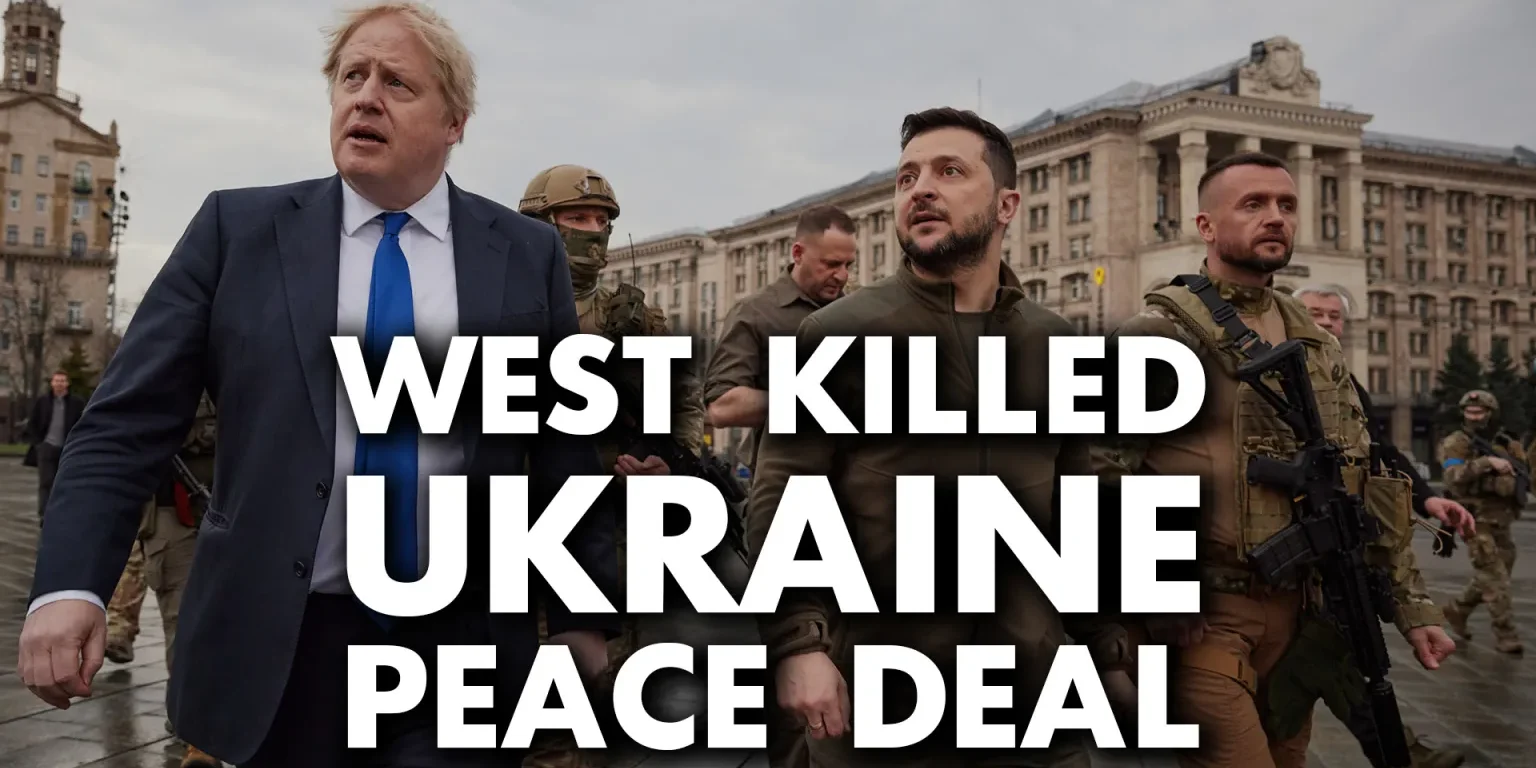
Photo composition with Boris Jhonson and Volodymyr Zelenskyy in the background walking on the street and "West Killed Ukraine Peace Deal" is written on the front. Photo: Multipolarista.

Orinoco Tribune – News and opinion pieces about Venezuela and beyond
From Venezuela and made by Venezuelan Chavistas

Photo composition with Boris Jhonson and Volodymyr Zelenskyy in the background walking on the street and "West Killed Ukraine Peace Deal" is written on the front. Photo: Multipolarista.
By Benjamin Norton – Sep 4, 2022
Russia and Ukraine agreed to a negotiated settlement to end the conflict in April, but British Prime Minister Boris Johnson intervened to stop the peace deal, and the US and EU escalated the proxy war to try to weaken Moscow.
In May, Ukraine’s avowedly anti-Russian newspaper Ukrainska Pravda published a bombshell report that got virtually no attention in the West, titled “Possibility of talks between Zelenskyy and Putin came to a halt after Johnson’s visit.”
The article noted, “The Russian side… was actually ready for the Zelenskyy-Putin meeting. But two things happened, after which a member of the Ukrainian delegation, Mykhailo Podoliak, had to openly admit that it was ‘not the time’ for the meeting of the presidents.”
Moscow: Borrell’s Statements Confirm that EU Renounced Peaceful Solutions
The newspaper continued:
According Ukrainska Pravda sources close to Zelenskyy, the Prime Minister of the United Kingdom Boris Johnson, who appeared in the capital almost without warning, brought two simple messages.
The first is that Putin is a war criminal, he should be pressured, not negotiated with.
And the second is that even if Ukraine is ready to sign some agreements on guarantees with Putin, they are not.
Johnson’s position was that the collective West, which back in February had suggested Zelenskyy should surrender and flee, now felt that Putin was not really as powerful as they had previously imagined, and that here was a chance to “press him.”
Three days after Johnson left for Britain, Putin went public and said talks with Ukraine “had turned into a dead end”.
The fact that Russia and Ukraine were willing to end the conflict diplomatically was further confirmed later by Foreign Affairs, the media arm of the powerful Council on Foreign Relations, which has a revolving door with the US government.
Fiona Hill, who served as the senior director for Europe and Russia on the US National Security Council in the Barack Obama administration, co-authored an article for the September/October edition of Foreign Affairs titled “The World Putin Wants.”
The former top US national security official overseeing Russia policy wrote:
According to multiple former senior U.S. officials we spoke with, in April 2022, Russian and Ukrainian negotiators appeared to have tentatively agreed on the outlines of a negotiated interim settlement: Russia would withdraw to its position on February 23, when it controlled part of the Donbas region and all of Crimea, and in exchange, Ukraine would promise not to seek NATO membership and instead receive security guarantees from a number of countries. But as Russian Foreign Minister Sergey Lavrov stated in a July interview with his country’s state media, this compromise is no longer an option.
These terms had apparently been ironed out in face-to-face peace talks in Istanbul, Turkey on March 29.
Hill did not reveal what killed the peace process, but the Ukrainska Pravda report from May made it clear that it was Western pressure on Ukraine that sabotaged the negotiated settlement.
As US Defense Secretary Lloyd Austin stated publicly on April 25, Washington’s goal was to use the proxy war in Ukraine to “weaken” Russia.
Sources
“Experts react: After Russia-Ukraine talks in Istanbul, is an end to war imminent?,” Atlantic Council, April 1, 2022
“Possibility of talks between Zelenskyy and Putin came to a halt after Johnson’s visit – UP sources,” Ukrainska Pravda, Roman Romaniuk, May 5, 2022
“The World Putin Wants,” Foreign Affairs, Fiona Hill and Angela Stent, September/October 2022
“Report: Russia, Ukraine Tentatively Agreed on Peace Deal in April,” Antiwar.com, Dave DeCamp
Brookings Institution funders in 2021 annual report
“No middle way between being independent country and colony, Putin says,” Russia’s Tass, June 9, 2022
“In long speech, Putin recognizes two Ukrainian regions as independent, a potential pretext for war,” Washington Post, February 21, 2022
“Foreign Affairs Council: Remarks by High Representative Josep Borrell upon arrival,” in Luxembourg on April 11, 2022:
JOURNALIST: Russians have criticised you for saying that the battle will be won on the battlefield. Do you still believe that this will be the case?
BORRELL: Normally wars have been won or lost on the battlefields. Yes.
Touched by the resilience, determination and hospitality of @ZelenskyyUA & @Denys_Shmyhal.
I return with a clear to do list:
1. This war will be won on the battlefield. Additional €500 million from the #EPF are underway. Weapon deliveries will be tailored to Ukrainian needs. pic.twitter.com/Jgr61t9FfW
— Josep Borrell Fontelles (@JosepBorrellF) April 9, 2022

Benjamin Norton is the founder and editor of the independent news website Multipolarista, where he does original reporting in both English and Spanish. Benjamin has reported from numerous countries, including Venezuela, Nicaragua, Bolivia, Ecuador, Honduras, Colombia, and more. His journalistic work has been published in dozens of media outlets, and he has done interviews on Sky News, Al Jazeera, Democracy Now, El Financiero Bloomberg, Al Mayadeen teleSUR, RT, TRT World, CGTN, Press TV, HispanTV, Sin Censura, and various TV channels in Mexico, Nicaragua, Venezuela, Ecuador, and Bolivia. Benjamin writes a regular column for Al Mayadeen (in English and Spanish). He was formerly a reporter with the investigative journalism website The Grayzone, and previously produced the political podcast and video show Moderate Rebels. His personal website is BenNorton.com, and he tweets at @BenjaminNorton.